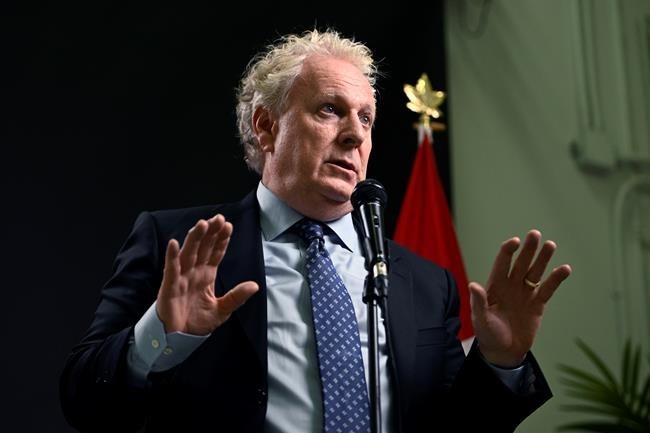
Conservative Leadership candidate Jean Charest answers questions from reporters after the third debate of the 2022 Conservative Party of Canada leadership race, in Ottawa, on Wednesday, Aug. 3, 2022. Charest compared opponents who didn't show up to federal Conservatives' last debate of the race to a fish not wanting to swim.THE CANADIAN PRESS/Justin Tang
Republished August 04, 2022 - 3:10 PM
Original Publication Date August 04, 2022 - 11:41 AM
OTTAWA - Jean Charest compared opponents who didn't show up to the federal Conservatives' final leadership debate to fish not wanting to swim.
But with six weeks left until a winner is named, Wednesday's eventwas largely an opportunity for the ex-Quebec premier to fish for votes.
"It's the only strategy remaining," said veteran Conservative strategist Melanie Paradis.
Charest had pressed the party to hold a third and final debate in the contest and applauded its decision to make it bilingual.
He appeared alongside rural Ontario MP Scott Aitchison and former Ontario MPP Roman Baber, while fellow candidates Leslyn Lewis and Pierre Poilievre decided to skip.
Tim Powers, whose work on Tory campaigns includes former prime ministers Stephen Harper and Joe Clark, questions if there might be blowback from some members disappointed with the no-shows — particularly Poilievre, the perceived front-runner.
"While he's popular now and he's vacuuming in the cash, he can never take Conservative party members for granted."
Charest's path to victory is believed to be a narrow one at best, and runs through his home province of Quebec, along with Ontario and Atlantic Canada.
His campaign has struck a more moderate tone and offered a suite of policies around spousal violence and health care, safety and climate change.
Throughout the race, as in Wednesday's debate, Charest hammered home that the party needs his experience as a political leader. He once served as leader of the erstwhile federal Progressive Conservatives and spent time as a minister in Brian Mulroney's cabinet.
Charest's attempt to lead the federal Conservatives has been a political comeback of sorts, with him having spent 20 years off Parliament Hill and the last decade out of elected politics.
His main rival Poilievre has been a member of Parliament since 2004 and boasts having sold nearly 312,000 party memberships during the race — a figure party headquarters hasn't publicly verified.
All told, the party says it has a voter list nearly 679,000 names long, 400,000 of which are believed to be new members.
With only 150,000 ballots returned to party headquarters as of Wednesday, Charest is speaking to the thousands who haven't yet filled theirs out.
At this stage, Paradis says Charest's only play is to try to appeal to as many supporters of other candidates as he can, in hopes they mark his name down on the party's ranked ballot.
"The real question is, if you're a Scott Aitchison supporter and you haven't filled out your ballot yet, are you now thinking, 'Well, maybe it's too close and I need to put Charest first'?"
During the debate, Charest was complimentary of both Aitchison and Baber. He agreed with Aitchison's calls for party unity and said Baber acted admirably when he stood for his belief against COVID-19 lockdowns, which got him booted from Ontario Premier Doug Ford's Progressive Conservative caucus.
At one point in the debate Charest spoke directly to members, telling them: "All of you have a place at the table, I want you to know that."
Rudy Husny, a political analyst and former Tory leadership candidate, says Quebec is crucial for Charest to win, and points to fundraising figures that show Poilievre is not to be underestimated next to the province's former leader.
Filings with Elections Canada show Poilievre raked in more than $4 million compared to Charest's $1.3 million.
Husny says the fact Poilievre drew money in from more Quebec donors than Charest did is a strong indicator of how many people are involved in the process and might be willing to turn up and vote.
Figures released by the party show the number of Conservative members in the province also swelled during the race to more than 58,000, up from the 7,648 it reported at the end of 2021.
This report by The Canadian Press was first published Aug. 4, 2022.
News from © The Canadian Press, 2022